MIT Senseable City Lab and Smart Cities Research Institute collaborate
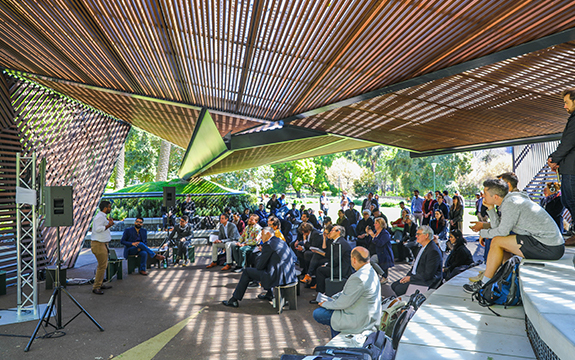
In Summary
- Students devise ideas to integrate Internet of Things into a future Fishermans Bend
- Students across faculties present at public forum at Carme Pinós’s MPavilion
- Workshop finds new approaches to urban development, putting people first
MIT Senseable City Lab and Swinburne Smart Cities Research Institute (SCRI) have partnered in a student workshop at the Swinburne Innovation Hub. Students were challenged to devise ideas to integrate digital media and information technology to benefit the future urban environment and urban renewal of Fishermans Bend in Melbourne, putting citizens first.
The Masters and PhD students from Design Factory Melbourne, Swinburne Design across diverse disciplines presented their ideas in a public forum at Carme Pinós’s MPavilion.
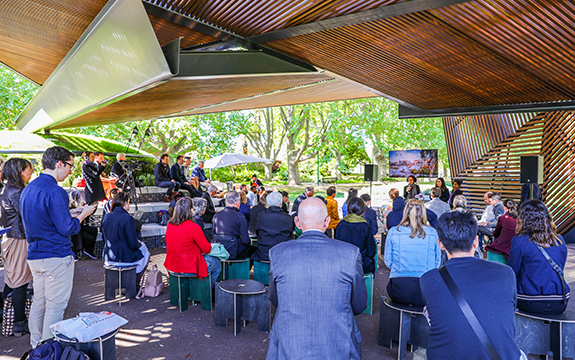 Students presenting their Ecosystem Eco Interface idea at MPavilion.
Students presenting their Ecosystem Eco Interface idea at MPavilion.
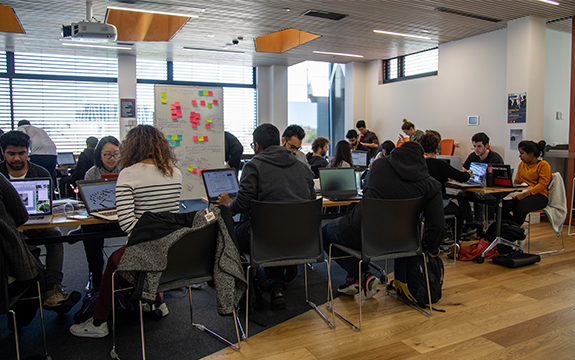 Cross-disciplinary students working in teams at Swinburne Innovation Hub.
Cross-disciplinary students working in teams at Swinburne Innovation Hub.
MIT Senseable City Lab works with the Internet of Things (IoT) to anticipate aspects of urban life that impact on people and to find new approaches to urban development. Through design and science it develops and implements tools so we can learn about cities, and our cities can learn from us.
SCRI investigates innovative approaches to address the challenges facing the world’s fast-growing cities, with a unique transdisciplinary socio-technical approach. The Institute spans the whole of the university, and brought together masters and PhD students from three faculties.
“Each team fielded at least one ‘hustler’, ‘hipster’ and ‘hacker’, drawn respectively from the faculties of Business and Law (FBL) Health, Art and Design (FHAD) and Science, Engineering and Technology (FSET),” SCRI Director, Professor Mark Burry AO explains.
“With a wide complement of business, creative, and technical skills, the participants quickly saw how powerful this combination is for generating ideas then strategising and translating them into credible outcomes in a very short space of time. We were amazed by the productivity. So were members of the public attending the pitch,” says Burry.
“The Fishermans Bend site is a prime area to embed sensors into the city. If we could use smart technologies while we recreate this part of the city and reconnect it to Melbourne, it’s a huge opportunity to create a unique place that’s not just an extension of what we have elsewhere,” says Fabio Duarte, Research Scientist, MIT Senseable City Lab.
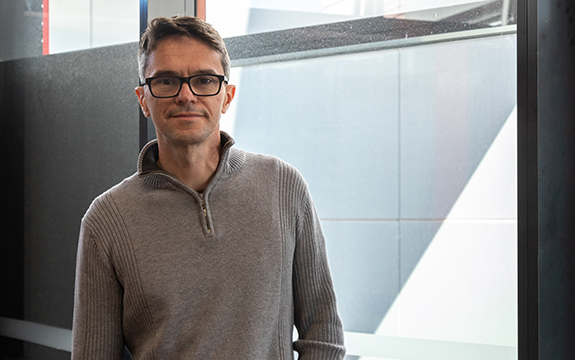 Dr Fabio Duarte, Research Scientist, MIT Senseable City Lab at the Swinburne workshop.
Dr Fabio Duarte, Research Scientist, MIT Senseable City Lab at the Swinburne workshop.
“In just two days most of the students came up with well-defined ideas. Some of them are very clever and easily implemented,” Dr Duarte says.
Seven ideas were developed by the multi-disciplinary teams. The ideas are based on collecting aggregated data from Fishermans Bend for and by the people, living things, infrastructure and buildings at the site.
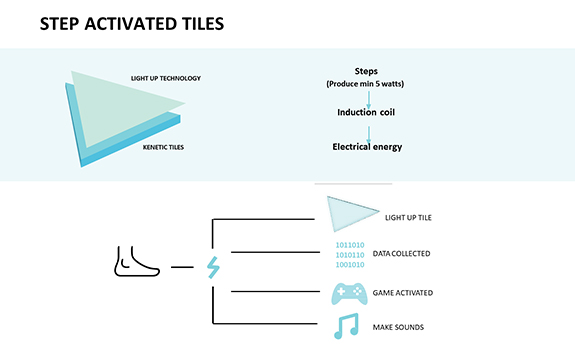 Step Out, gamifying health with smart step illuminated tiles in public spaces - Cristobel Sierra Celis, Akhil Joseph, Meghrajsinh Mahipatsinh Mahida, Melanie Calleja.
Step Out, gamifying health with smart step illuminated tiles in public spaces - Cristobel Sierra Celis, Akhil Joseph, Meghrajsinh Mahipatsinh Mahida, Melanie Calleja.
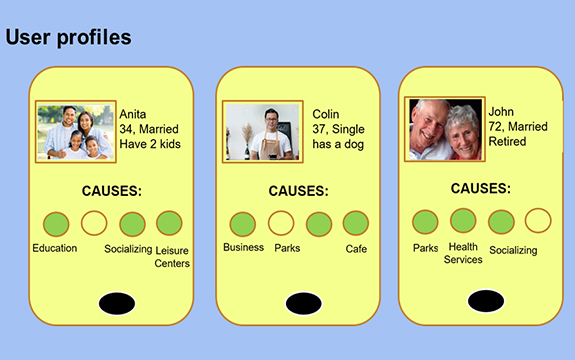 Civitas augmented gaming experience collects data for and about the community - Naeimeh Assadpour Zavehei, Ruth Lewis, Eugene Hawkins, Abdul Hakeem Fai zan Mohammed.
Civitas augmented gaming experience collects data for and about the community - Naeimeh Assadpour Zavehei, Ruth Lewis, Eugene Hawkins, Abdul Hakeem Fai zan Mohammed.
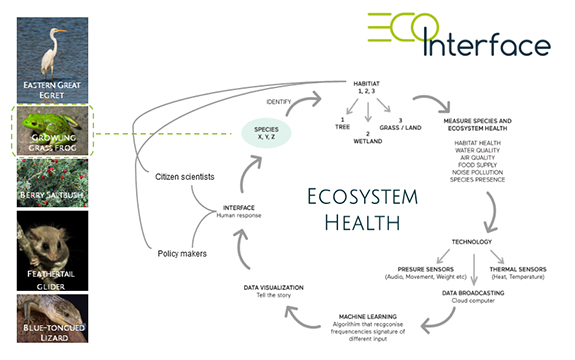 Ecosystem Eco Interface, social ecological system for wetlands of Fisherman’s Bend - Melissa Pineda Pinto, Deanna Rocha, Liam Anderson, Jing Tan.
Ecosystem Eco Interface, social ecological system for wetlands of Fisherman’s Bend - Melissa Pineda Pinto, Deanna Rocha, Liam Anderson, Jing Tan.
“Fishermans Bend will go through a radical transformation and we are almost starting from the very beginning,” explains Dr Duarte.
“We know some of the ideas can’t be implemented immediately but they could serve as inspiration for the development. If this is successful the ideas could be expanded to other areas in Victoria. The students have some great ideas,” he says.
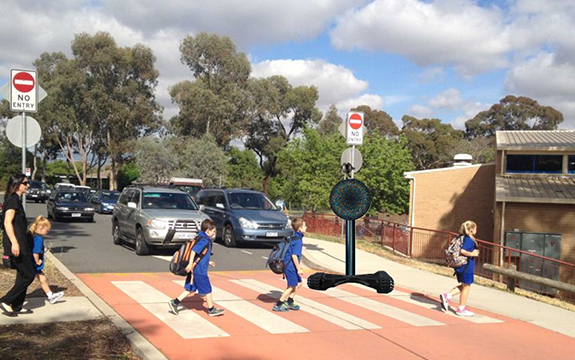 Team Lollipop robotic assistants guide people safely in the urban environment - Faisal Mahmood, Siddarth Girish Nair, Srdjan Kotush, Nataly Alejandra, Jeannie Foo, Arevalo Garcia.
Team Lollipop robotic assistants guide people safely in the urban environment - Faisal Mahmood, Siddarth Girish Nair, Srdjan Kotush, Nataly Alejandra, Jeannie Foo, Arevalo Garcia.
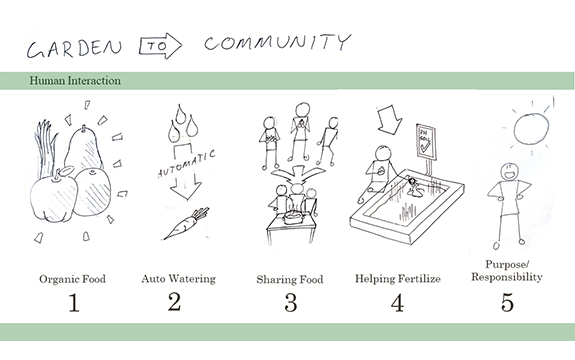 Spotlight smart community garden - Benjamin Britton, Tim Delaney, Jeeva Selina Ali, Kanika Shah.
Spotlight smart community garden - Benjamin Britton, Tim Delaney, Jeeva Selina Ali, Kanika Shah.
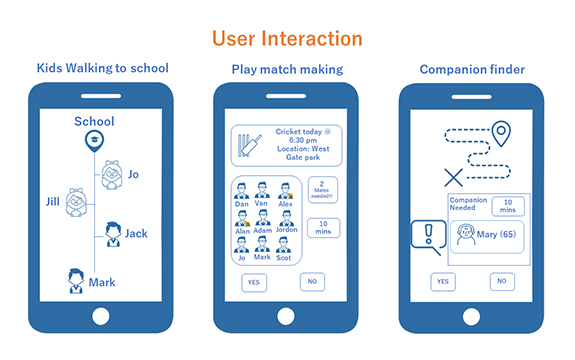 Compool choreographs serendipity with communal match making - Gokul Sidarth Thirunavukkarasu, Vaibhav Navinchandra Vaniya.
Compool choreographs serendipity with communal match making - Gokul Sidarth Thirunavukkarasu, Vaibhav Navinchandra Vaniya.
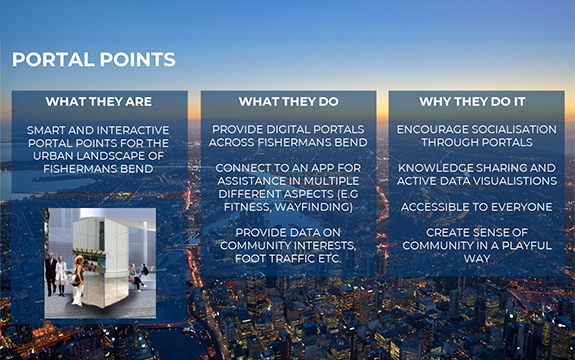 Avoiding Automated Dystopia supports diversity, social engagement and access with digital portal points - James Hamilton, Irfan Ahmad, Melanie Phillips.
Avoiding Automated Dystopia supports diversity, social engagement and access with digital portal points - James Hamilton, Irfan Ahmad, Melanie Phillips.
MIT Senseable City Lab and Swinburne Smart Cities Research Institute are producing a book due for release in December, documenting the ideas for presentation to the Victorian government and urban development partners.

